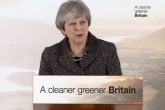WRAP calls for industry input into plastic waste and recycling strategy proposals
The Waste and Resources Action Programme (WRAP) has called for cross-industry contributions to a Plastic Waste and Recycling Strategy to drive work on achieving the aims of the government’s 25 Year Environment Plan in a letter sent to waste and resource industry stakeholders today (9 February).
The long-awaited 25 Year Environment Plan, released in January, set out a raft of proposals on plastic waste in order to achieve the Plan’s headline commitment to eliminate ‘avoidable’ plastic waste by 2042.
Before Christmas, Environment Secretary Michael Gove asked WRAP Chief Executive Marcus Gover and INCPEN (Industry Council for research on Packaging and the Environment) Chief Executive Paul Vanston to collate the views of stakeholders into a set of outline proposals to identify how the UK can increase plastic recycling and reduce its environmental impact.
In WRAP’s letter, written by Gover, the focus is placed on plastic packaging, which accounts for 70 per cent of plastic waste, and calls for further collaboration from industry to facilitate progress on packaging recycling.
Gover identifies four areas where action is needed:
- Action by businesses to change how they design and use plastic packaging;
- Action by Government to reform the plastic packaging producer responsibility regulation;
- Action by local authorities and the recycling sector to increase the quantity and quality of plastic packaging collected for recycling; and
- Action by citizens to change how they use and dispose of plastic packaging.
WRAP’s action for business rests on companies and retailers joining its Circular Plastics Commitment, which it announced back in January and is set for a high-profile launch in the spring. The Commitment is a joint initiative with the Ellen MacArthur Foundation (EMF) and looks to implement the principles of the Foundation’s ‘New Plastics Economy’.
The Commitment would see signatories actively work to eliminate unnecessary and problematic single-use plastic packaging, to ensure all plastic packaging is practically recyclable and to use recycled plastic in packaging and products where possible.
To facilitate action from business, Gover calls on support from the government in the form of changing the current packaging producer responsibility regime, including fast-tracking changes to the Packaging Recovery Note (PRN) in order to improve packaging environmental outcomes and to support the Circular Plastics Commitment.
Gover also calls for increased packaging recycling targets - 2018’s plastic packaging target is 53 per cent - saying: ‘We will certainly have to propose increasing the recycling targets for plastic packaging and also probably have to consider splitting the targets by plastic type.’
Such targets must be ‘radical’ and ‘ambitious but achievable’ to satisfy the public and political demand for action on plastics. Before putting forward proposals to the government over new targets, WRAP is hoping to arrange a series of workshops with stakeholders between February and March before a summit in April to bring together industry input on the matter.
In order to increase the amount of plastic packaging captured in recycling collections, WRAP is calling on local authorities to drive the transition towards WRAP’s Framework for Greater Consistency in Household Recycling, which aims to see every local authority collecting the same core set of eight materials by 2025 and which WRAP ‘expects’ to be considered as part of the upcoming Resources and Waste Strategy. The collection of plastic film and recycling on-the-go will also be looked at.
It is hoped that this would go some way top reducing the confusion and lack of understanding regarding what can and cannot be recycled, while WRAP will continue to promote its recycling information site Recycle Now and run a specific plastics campaign linked to the Circular Plastics Commitment to increase citizens’ knowledge of recycling. These campaigns will also explain the value and importance of packaging ‘in protecting goods and preventing food waste’. While the campaigns will be funded by Defra and carrier bag charge donations from some retailers for the meantime, it is hoped that a reformed producer responsibility system could provide funding in the future.
The letter finishes with a call for contributions from stakeholders in order to be able to present a coherent and thorough set of proposals to the Environment Secretary. Gover writes: ‘We can only make progress if we all work together – plastic producers, packaging manufacturers, food and drink manufacturers, retailers, brands, local authorities, waste companies, recyclers and governments. Paul [Vanston] and I look forward to fruitful, future cooperation with you; and we are keen to have wide involvement in this process.’
For more information on how to contribute to WRAP’s work on proposals for reducing plastic packaging waste, contact WRAP or visit the organisation’s website.








